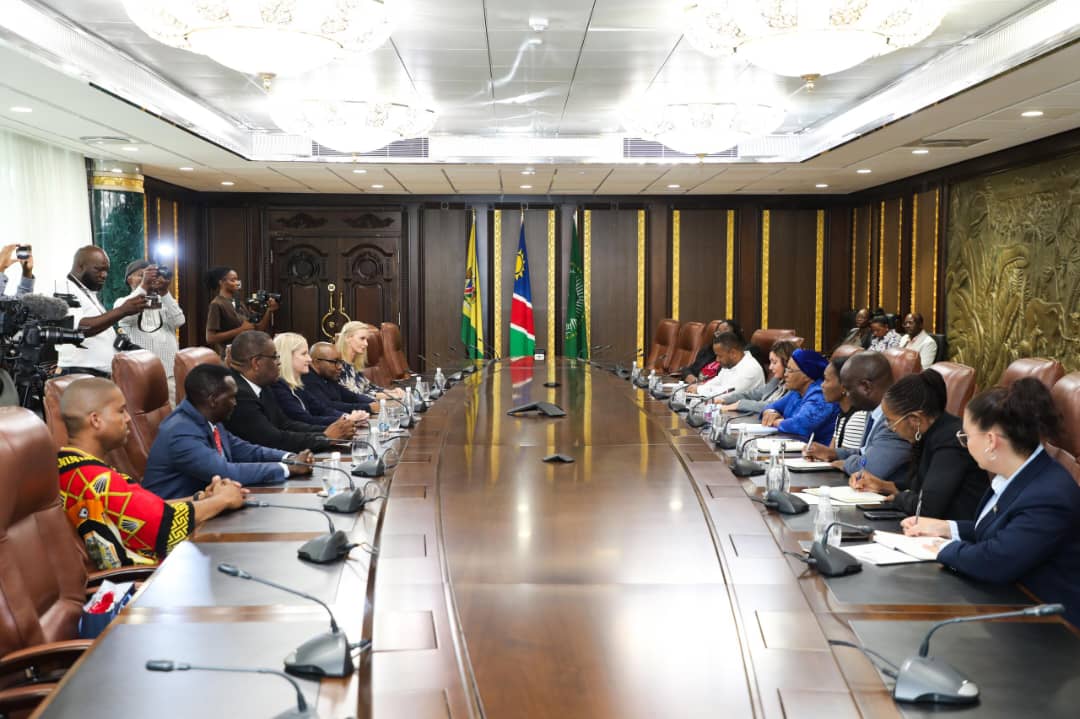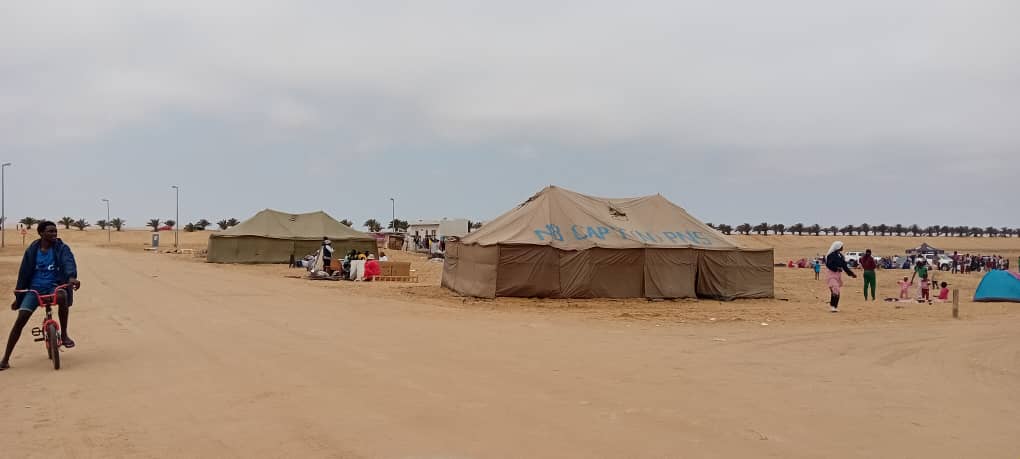HARARE, Zimbabwe – Police stormed the offices of Zimbabwe’s main opposition party yesterday and arrested its leader hours before he planned to talk to reporters about a wave of political violence that had left him briefly hospitalised.
Party head Morgan Tsvangirai was taken along with other political opponents of President Robert Mugabe in a bus to an undisclosed location by officers who had sealed off approaches to his headquarters and fired teargas to drive away onlookers, the party and witnesses said. Tsvangirai had been expected to brief reporters about the alleged abduction at gunpoint on Tuesday of a senior party official.But, after releasing him, police denied having arrested him.It has also emerged that the Mugabe government has set up a reserve force of war veterans, who fought in Zimbabwe’s 1970s liberation war in what analysts described as a bid to bolster his hold on power and to clamp down growing opposition to his long rule.The Movement for Democratic Change said Tsvangirai had been scheduled to give a press conference on President Robert Mugabe’s government’s escalating violence against and intimidation of political opponents.”Tsvangirai and a number of others we have not been able to identify have been taken by police in a bus.We don’t know their whereabouts.We don’t know if they have been charged,” said Eliphas Mukonoweshuro, an aide to Tsvangirai.Also yesterday, Mukonoweshuro reported a series of mysterious assaults on party officials.He said one, Last Maengahama, was abducted on Tuesday by unidentified assailants after a memorial service for an activist killed during the March 11 unrest.Maengahama was taken to a small town in north-eastern Zimbabwe, stripped and dumped in the bush, Mukonoweshuro said.Tsvangirai, 54, also was arrested along with about 50 other people on March 11 as opposition, church, student and civic groups tried to stage a prayer meeting.Supporters said police smashed his head against a wall repeatedly.He suffered deep lacerations and swelling.He left the hospital in a wheelchair on March 16.Tsvangirai said on Tuesday he would boycott presidential elections scheduled for next year unless the poll is carried out under a new democratic constitution that ensures they are free and fair.”We will never go into an election that is predetermined,” Tsvangirai said at a memorial service for Gift Tandare, 31, who was shot and killed at the March 11 prayer meeting.Tsvangirai told about 800 mourners there was no going back on a campaign of protests to demand reform and pressure Mugabe to step down.”We will not betray Gift and the people who have sacrificed themselves for the people of this country,” he said.Zimbabwe’s Roman Catholic bishops said Tuesday that the political and economic crisis in Zimbabwe had reached a flash point and further bloodshed and a mass uprising could only be averted by democratic reforms.”As the suffering population becomes more insistent, generating more and more pressure through boycotts, strikes, demonstrations and uprisings, the state responds with ever harsher oppression through arrests, detentions, banning orders, beatings and torture,” the Zimbabwe Catholic Bishops Conference said in an Easter pastoral letter.* Meanwhile, ZimOnline reports that President Robert Mugabe’s government has set up a reserve force of war veterans, who fought in Zimbabwe’s 1970s liberation war, in what analysts described as a bid to bolster his hold on power and to clamp down growing opposition to his long rule.According to the latest government gazette, the Defence (War Veterans Reserve) Regulations 2007 would see war veterans, who Mugabe has relied on to drum up support during elections since 2000, becoming a reserve force.The war veterans gained notoriety for their often violent invasion of white-owned commercial farms.The MDC has accused the veterans of unleashing an orgy of violence in the run-up to the 2002 election, which left more than a 100 of its members dead.”There is hereby established a reserve force of the army to be known as the war veterans reserve,” according to the gazette.”The war veterans reserve shall consist of members of the war veterans from a register of the war veterans compiled in terms of the War Veterans Regulations of, 1997, … who volunteer to serve in the war veterans reserve and are accepted into the reserve by the Commander,” it added.There would be two classes of war veterans, with the first consisting of members below 50 years who can be deployed into active military duty and can undergo training if the Commander of the army decides so.Those above 50 years “can be deployed for such duties not requiring physical military training as the Commander may determine”, according to the gazette, which said members of the reserve force could be issued with “such arms, clothing and equipment as his or her duties require”.They will also benefit from travel and medical expenses just like active members of the army.Analysts say the timing of the setting up of the reserve force was crucial as political tensions escalate in the face of the economic crisis.They also say the reserve force was one way of responding to the opposition threats of peaceful mass protests against his rule.Nampa-AP -ZimonlineTsvangirai had been expected to brief reporters about the alleged abduction at gunpoint on Tuesday of a senior party official.But, after releasing him, police denied having arrested him.It has also emerged that the Mugabe government has set up a reserve force of war veterans, who fought in Zimbabwe’s 1970s liberation war in what analysts described as a bid to bolster his hold on power and to clamp down growing opposition to his long rule.The Movement for Democratic Change said Tsvangirai had been scheduled to give a press conference on President Robert Mugabe’s government’s escalating violence against and intimidation of political opponents.”Tsvangirai and a number of others we have not been able to identify have been taken by police in a bus.We don’t know their whereabouts.We don’t know if they have been charged,” said Eliphas Mukonoweshuro, an aide to Tsvangirai.Also yesterday, Mukonoweshuro reported a series of mysterious assaults on party officials.He said one, Last Maengahama, was abducted on Tuesday by unidentified assailants after a memorial service for an activist killed during the March 11 unrest. Maengahama was taken to a small town in north-eastern Zimbabwe, stripped and dumped in the bush, Mukonoweshuro said.Tsvangirai, 54, also was arrested along with about 50 other people on March 11 as opposition, church, student and civic groups tried to stage a prayer meeting.Supporters said police smashed his head against a wall repeatedly.He suffered deep lacerations and swelling.He left the hospital in a wheelchair on March 16.Tsvangirai said on Tuesday he would boycott presidential elections scheduled for next year unless the poll is carried out under a new democratic constitution that ensures they are free and fair.”We will never go into an election that is predetermined,” Tsvangirai said at a memorial service for Gift Tandare, 31, who was shot and killed at the March 11 prayer meeting.Tsvangirai told about 800 mourners there was no going back on a campaign of protests to demand reform and pressure Mugabe to step down.”We will not betray Gift and the people who have sacrificed themselves for the people of this country,” he said.Zimbabwe’s Roman Catholic bishops said Tuesday that the political and economic crisis in Zimbabwe had reached a flash point and further bloodshed and a mass uprising could only be averted by democratic reforms.”As the suffering population becomes more insistent, generating more and more pressure through boycotts, strikes, demonstrations and uprisings, the state responds with ever harsher oppression through arrests, detentions, banning orders, beatings and torture,” the Zimbabwe Catholic Bishops Conference said in an Easter pastoral letter.* Meanwhile, ZimOnline reports that President Robert Mugabe’s government has set up a reserve force of war veterans, who fought in Zimbabwe’s 1970s liberation war, in what anal
ysts described as a bid to bolster his hold on power and to clamp down growing opposition to his long rule.According to the latest government gazette, the Defence (War Veterans Reserve) Regulations 2007 would see war veterans, who Mugabe has relied on to drum up support during elections since 2000, becoming a reserve force.The war veterans gained notoriety for their often violent invasion of white-owned commercial farms.The MDC has accused the veterans of unleashing an orgy of violence in the run-up to the 2002 election, which left more than a 100 of its members dead.”There is hereby established a reserve force of the army to be known as the war veterans reserve,” according to the gazette.”The war veterans reserve shall consist of members of the war veterans from a register of the war veterans compiled in terms of the War Veterans Regulations of, 1997, … who volunteer to serve in the war veterans reserve and are accepted into the reserve by the Commander,” it added.There would be two classes of war veterans, with the first consisting of members below 50 years who can be deployed into active military duty and can undergo training if the Commander of the army decides so.Those above 50 years “can be deployed for such duties not requiring physical military training as the Commander may determine”, according to the gazette, which said members of the reserve force could be issued with “such arms, clothing and equipment as his or her duties require”.They will also benefit from travel and medical expenses just like active members of the army.Analysts say the timing of the setting up of the reserve force was crucial as political tensions escalate in the face of the economic crisis.They also say the reserve force was one way of responding to the opposition threats of peaceful mass protests against his rule.Nampa-AP -Zimonline
Stay informed with The Namibian – your source for credible journalism. Get in-depth reporting and opinions for
only N$85 a month. Invest in journalism, invest in democracy –
Subscribe Now!










